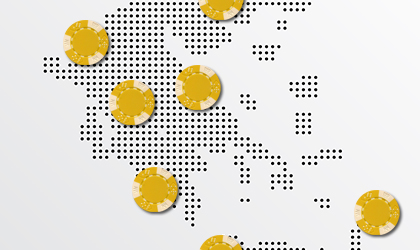Greece Online Gambling Regulation
Greece’s monopoly gambling operator OPAP is seeking in excess of €1b in damages as a result of the Government’s “abrupt and counterproductive interventions” in its business. The Greek Government also recently announced its intention to establish a new licensing regime for online gambling.
(first appeared in the World Online Gambling Law Report - January 2016)
Greece’s Gambling Law came into force in 2011 following a lengthy implementation process that brought Greece once again face to face with its EU obligations in order to fix a number of issues concerning gambling in Greece. The choice was to preserve the dominant position of the then state owned gaming operator OPAP by awarding it a licence to operate national bets and manage all 35,000 remote gambling machines. The Law imposed barriers to accessing unlicensed online gambling services in Greece and set strict obligations for internet service providers to block all sites contained in a ‘blacklist’ of prohibited gambling sites managed by the Greek Gaming Commission (‘GGC’). The GCC affirmed in Decision No. 105/2/26.5.2014 (the Internet Gambling Regulation) and 51/26.4.2013 (the ISP’s liability on accessing illegal online gambling sites, Article 3.4) that the Law also provided for a general prohibition on all bank transfers to accounts of ‘illegal’ gambling websites. The main issue concerned whether it was legitimate for the government to protect OPAP’s monopolistic position, whilst at the same time blocking access to online gambling sites run by companies with a legitimate licence to offer online gambling services elsewhere in Europe.
Further requirements published in Greece’s approved new gambling bill, will require affiliate marketing partners to register and pay a €1,000 licensing fee with the Hellenic Gaming Commission (HGC). This October, following a year of deliberation, the Greek Parliament progressed final amendments of its new gambling bill, which will introduce a modern regulatory framework for online. In March 2015, the Greek government announced plans to issue new online gambling licenses in an effort to raise EUR 500 million a year for the country. The licenses would cost EUR 3 million each and would be valid for five years. In May 2016, tax on gross gaming revenue increased from 30% to 35%.


The Remote Gambling Association and a number of online gambling companies challenged the Law on the grounds that it breached fundamental EU principles. The issue reached the Court of Justice of the European Union (‘CJEU’), through a preliminary ruling under Article 267 of the Treaty on the Functioning of the European Union (‘TFEU’), which resulted in the establishment of basic principles regarding online gambling and the power of local legislators to set barriers. In joined cases C186/11 and C209/11 Advocate General Mazak stated that the monopolistic position held by OPAP was in breach of EU law, but that a national gambling monopoly can be justified as an attempt to restrict the supply of games of chance or combat criminality related to gambling, but that the State has a strict duty to justify the same.
The CJEU issued a decision that sent the issue back to the national court in order to decide according to the local social implications of gambling whether this limitation could apply and set the general rule that every national court should take into account in such cases that “[…] it is common ground that, unlike the introduction of free, undistorted competition in a traditional market, the presence of that kind of competition in the very specific market of games of chance, that is to say, between several operators authorised to run the same gamesof chance, is liable to have detrimental effects owing to the fact that those operators would be led to compete with each other in inventiveness in making what they offer more attractive and, in that way, increasing consumers’ expenditure on gaming and the risks of their addiction […]
Accordingly, the refusal to allow a transitional period in the event of incompatibility of national legislation with Articles 43 EC and 49 EC does not necessarily lead to an obligation for the Member State concerned to liberalise the market in games of chance if it finds that such a liberalisation is incompatible with the level of consumer protection and the preservation of order in society […].” The CJEU reaffirmed its opinion in the Liga Portuguesa case2 and has been the grounds of several cases brought before the CJEU3. Europe’s gambling market lacks harmonisation mainly due to the cultural diversity between Member States concerning the social impact of gambling. Accordingly no rules apply to monopolistic behaviour in Europe.
he Greek Government and the Ministry of Finance were more than happy with this outcome. OPAP was great for attracting investors and one of the safest state-owned companies to put on sale during the financial crisis. 33% of its shares were sold for more than €650m in mid-2013 helping to resurrect the national economy. The Government was left with a 34% share, but no decisional power. OPAP was happy as it reserved its dominant position and
managed to establish a solid online presence. So, was this scenario a victory for all? It could have been but the leftist Syriza party, who back in 2013 were in opposition, heavily criticised the sale as a national crime and a social danger.
Two sides of the argument
Greece Online Gambling License

When the new Chairman of the gaming NRA (the Greek Gaming Committee) presented to the committee responsible for approving his appointment, he stated that virtual lottery terminals (‘VLTs’) are a major danger for a society hit by the crisis. So in June 2015 the NRA amended the licensing of the VLTs awarded to OPAP issuing Regulation 158/4/5-6-20154 that set stricter rules for VLTs and initiated the start of uncertainty in the market’s future. The new rules lowered the jackpot levels, daily loss limits and the length of play allowed. OPAP, which had predicted that it would make up to €1bn per year from VLTs, announced that the developments were totally unexpected and that it would need time to ensure the machines complied with the new rules. OPAP now claims that the new regulation contains heavy restrictions, defies international best practice, makes the project economically unviable and that timely implementation is almost impossible. A group of prospective business partners of OPAP, which claim they had already developed a network for VLTs, sued the Chairman of the NRA Antonis Stergiotis, while OPAP itself has announced that it is seeking in excess of €1b in damages as a result of the Government’s “abrupt and counterproductive interventions” in its business.
The capital control measures imposed on bank accounts in the summer of 2015 also seem to have impacted OPAP’s turnover. On top of that the new Government decided to impose a new tax on OPAP’s gambling products that took effect as of January 2016.OPAP and the Federation of Professional Agents of OPAP’s Lottery have decided to appeal against this new tax claiming thatimposing a fee of €0.05 per column in each game is unconstitutional, contrary to the European Convention of Human Rights (‘ECHR’), and EU and Greek legislation and creates huge technical problems, due to the failure of electronic adjustment systems for the collection of such a fee. They also claim that this is a new tax, the imposition of which violates the constitutional principle of equality and universality of taxes, as it is only applied to services offered by OPAP. A final argument is that this tax violates the ECHR, which protects economic liberty and property, and Directive 2006/112/EC, which prevents Member States from introducing charges which can be characterised as turnover taxes.
When Emma Delta Hellenic Holdings Ltd signed for the acquisition of 33% of OPAP’s shares the Government accepted that no additional tax would be imposed up to 2020. It is apparent that either the new Government doesn’t want to promote gambling and, thus, is imposing strict regulations on OPAP’s business or that the new political party would like to reshuffle the gambling
market and make it more friendly to its policy.
KETHEA, the largest rehabilitation and social reintegration network in Greece, recently published results of a survey that show that gambling addicts seeking help have increased 20-25% in the past five years, a fact that is attributed mostly to the financial crisis and the average entry age to gambling reducing to 20 from 25. Also, the rate of online gambling has risen significantly.
Online gambling licensing


The Deputy Finance Minister and the Chairman of the Gambling Committee recently stated that the transition phase of having 24 online gambling providers on temporary licences since 2011 should end soon. The current Government expressed the same intention a year ago. All governments, since 2011, have
moved very slowly towards the legalisation of online gambling mainly because of the pressures of OPAP. And today as discussed many fronts are open in the battle with OPAP. The tax expected from a legalised online gambling market is somewhere between €60-120m, but over the last three years only a meagre €62,000 has been paid by the 24 companies. According to the Government the new licencing regime will require operators to have premises in Greece, in order to control taxation, and for security reasons.
However, the truth is that if the Government does not legalise the 24 providers, it will be accused of distorting competition, something that will affect the new tax on OPAP’s games. If they go ahead with the new licences and include sports betting, then OPAP will raise more claims (OPAP considers that it has the exclusive right up to 2020). It is expected that more than €500m will be gathered through licensing online gambling but the Government is also aware that offering licences for online gambling that exclude sports betting will be highly unattractive.
Related Articles
OPAP Q3 bounce back hurt by continued lottery declines
Intralot taps all cost-saving options to soften Covid blows
HGC requires disclosure for key services and personnel
The Greek government has settled on amendments to finally approve the passage of its revamped gambling bill, launching the country’s first regulated online gambling framework.
First sanctioned in September 2018 with the aim of overhauling Greek gambling’s licensing regime and industry-wide regulations, final provisions of the new gambling bill have been approved by the European Commission (EC) and Greece’s House of Representatives.
The new bill sees Greece end the ‘transition status’ granted to 24 online gambling enterprises which were issued temporary licences during 2011. The operators will be allowed to fulfil their temporary licences until 31 March 2020 but will, thereafter, have to reapply for new certification.
Final licensing amendments see Greece settle on a €3 million licence fee for online sports betting and RNG (slot) provisions, with incumbents able to pay €1 million for additional product extensions.
Greece Online Gambling Regulations
At a fiscal level, Greece maintains its much-contested 35% gross gaming revenue tax rate on top of further corporation charges. However, final modifications saw the Greek government allow licensed operators to discount GGR taxes before standard 20% corporate tax is applied.
The progress of the gambling bill has seen a number of initial criteria dropped by the Greek government, such as requirements for €500,000 deposit for licensing reviews by Greece’s Finance Ministry.
Furthermore, the government dropped plans to include a ‘15-20% variable tax’ on online gambling player winnings above €100 and €500 range.
Greece Online Gambling Laws
As communicated throughout the procedure, the Greek government won’t allow ‘black-listed operators’ to apply for licensing for a period of up to 12 months.
All licensing applications will be monitored and processed by the Hellenic Gaming Commission as lead regulatory body.